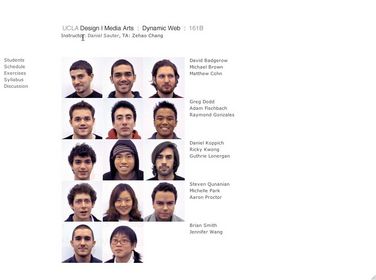Syllabus
Dynamic Web
UCLA DESMA 161B, Winter 2005
Instructor: Daniel Sauter (dsauter
[at] ucla [dot] edu)
TA: ZehaoChang (zai [at] ucla [dot] edu)
Ten weeks studio course, 2 x 3 hours, outside study 8 hours. Prerequisite
DESMA 161A.
Time: MW 2:00 pm ñ 4:50 pm; Location: Kinross South S128
Office Hours: Daniel Sauter Wednesdays 5-6 pm KINR SO S122; Zehao Chang:
tbd.
Class website: http://classes.design.ucla.edu/Winter05/161B
†
Description
This advanced course will focus on the production of dynamic content for the World Wide Web. Based on the skills acquired in the introductory class ìCreative Webî (161A), this course is intended to provide a foundation for professional Web production, utilizing databases and teaching how to separate design from content. In the context of this class ëdynamicí refers to both web pages which contain dynamic elements and the creation of dynamic pages which are built at runtime. Although this class offers a wide range of workshops dealing with technologies, it focuses on the conceptual and aesthetic aspects of designing for the web. Creative projects and exercises will be developed throughout the course, utilizing the various skills acquired in class in the service of perception and communication.
Web technologies are constantly and rapidly changing. By focusing on the concepts behind those technologies, the acquired skills working with HTML, PHP, MySQL, Flash/ActionScript, JavaScript and CSS will be transferable to future contexts. Furthermore, the course will help to develop the necessary vocabulary to plan, execute and discuss Web projects, speak to developers, and to pursue individual research. Through the quarter, students will have the opportunity to complete a series of exercises and projects, analyze work, and present a research report.
Evaluation
Exercises and Projects will be evaluated based on their originality, their aesthetic and conceptual qualities (80%). Active contribution during class and attendance is required (10%). The participants will conduct individual research on a chosen topic, analyze Web projects and present the results to the class (10%). All assignments must be completed in order to pass the course. Late assignments will reduce their grade by one unit for each day. Exercises and Projects are only considered as completed when they are accessible from the course website. Letter grades will be made available trough MyUCLA (http://my.ucla.edu). There will be a sign-up sheet for each class meeting; it is the studentsí responsibility sign up in this list. More than two unexcused absences (without the teachersí permission before the class meetings) will decrease the final grade by one unit with each additional absence dropping the final grade by another unit.
Exercises and Projects
1: Programming dynamic pages
2: Databases and Data Visualization
3: Dynamic pages and Animation
4: Final Project
Grading
10%: Participation/Contribution, Attendance
10%: Research Report (15 min class presentation on a topic chosen in class), Web analysis (10 min class presentation of: a dynamic page (built at runtime) and a Flash project, analyzing aspects of navigation, structure, design, interactivity and motion)
30%: Exercises 1 ñ 3
30%: Projects 1 ñ 3
20%: Final Project 4
Required Readings (required in 161A, available at UCLA LuValle Bookstore
on Campus):
Niederst, Jennifer: Web Design in a Nutshell, 2nd Edition. Sebastopol: OíReilly, 1999.
Recommended Readings
Lerdorf, Rasmus and Tatroe, Kevin: Programming PHP. Sebastopol: OíReilly 2002.
Moock, Colin: ActionScript for Flash MX: The Definitive Guide. Sebastopol: OíReilly, 2003.
Bolter, J. D. and Gromala D.: Windows and Mirrors: Interaction Design, Digital Art, Andt The Myth Of Transparency. Cambridge, Massachusetts; London, England: The MIT Press, 2003.
Galloway, Alexander R.: Protocol: How Control Exists After Decentralization. Cambridge, Massachusetts; London, England: The MIT Press, 2004.
Greene, Rachel: Internet Art. New York: Thames & Hudson world of art, 2004.
Cloninger, Curt: Understanding the Web as Media, website, http://www.lab404.com/media/.
Lessig, Lawrence: Free Culture: How Big Media Uses Technology And The Law To Lock Down Culture And Control Creativity. New York: The Penguin Press, 2004.
Druckrey, Timothy and Weibel, Peter: Net_condition, Art and Global Media. Cambridge, Massachusetts; London, England: The MIT Press, 1999.
Online Sources
PHP Reference
PHP Manual
PHP Tutorial
